Unit 9 Have you ever been to a museum? Section A 1a-2d 课件 (共44张PPT)
文档属性
| 名称 | Unit 9 Have you ever been to a museum? Section A 1a-2d 课件 (共44张PPT) | 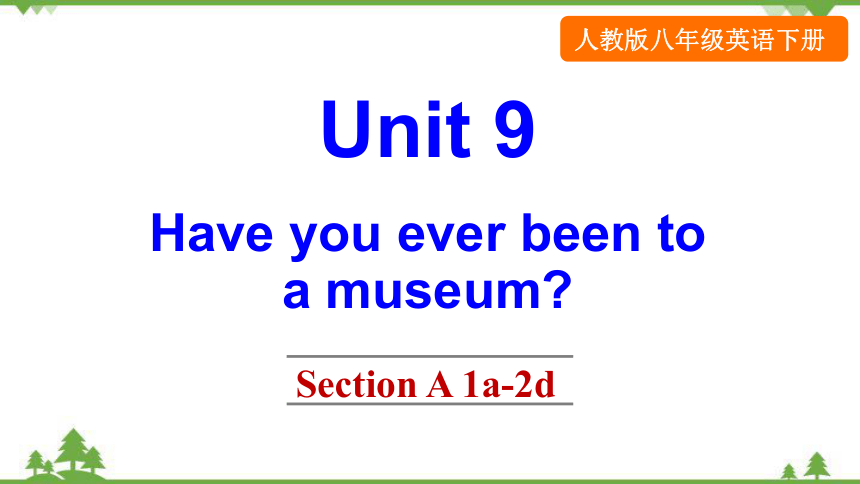 | |
| 格式 | ppt | ||
| 文件大小 | 3.3MB | ||
| 资源类型 | 教案 | ||
| 版本资源 | 人教新目标(Go for it)版 | ||
| 科目 | 英语 | ||
| 更新时间 | 2022-05-31 21:52:03 | ||
图片预览

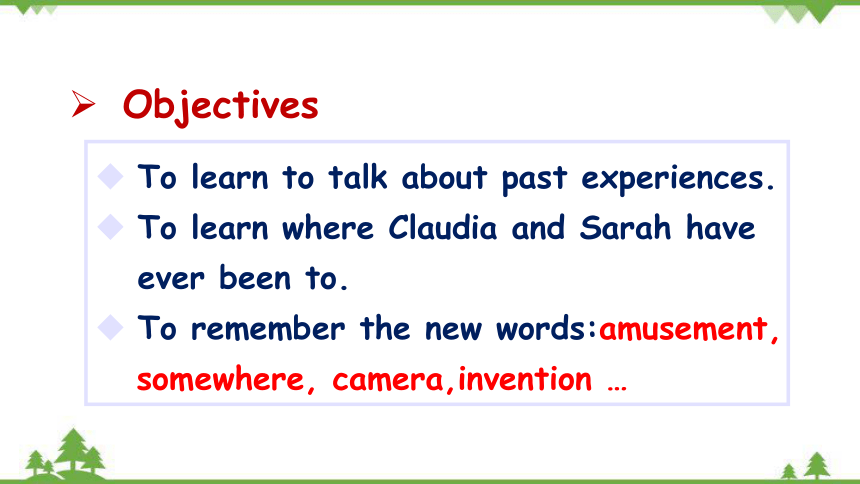
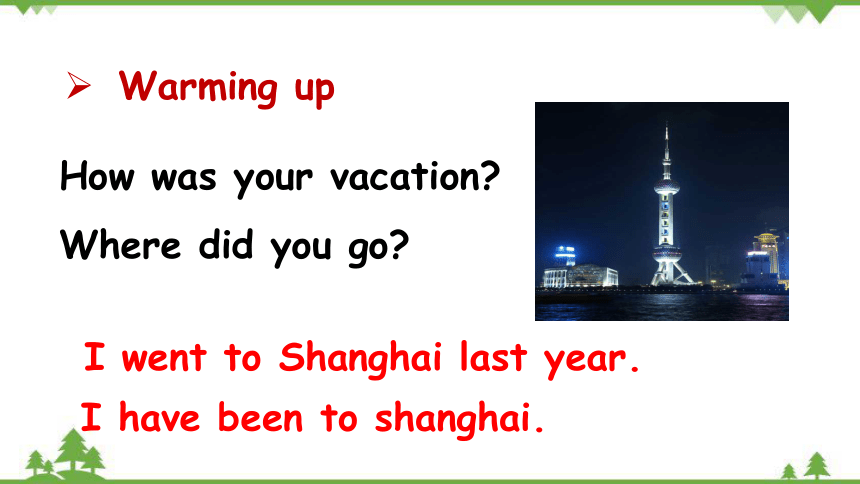
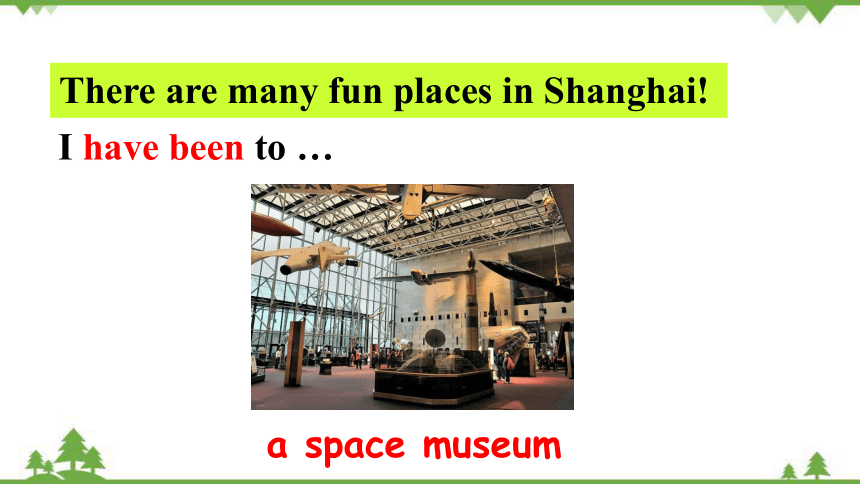
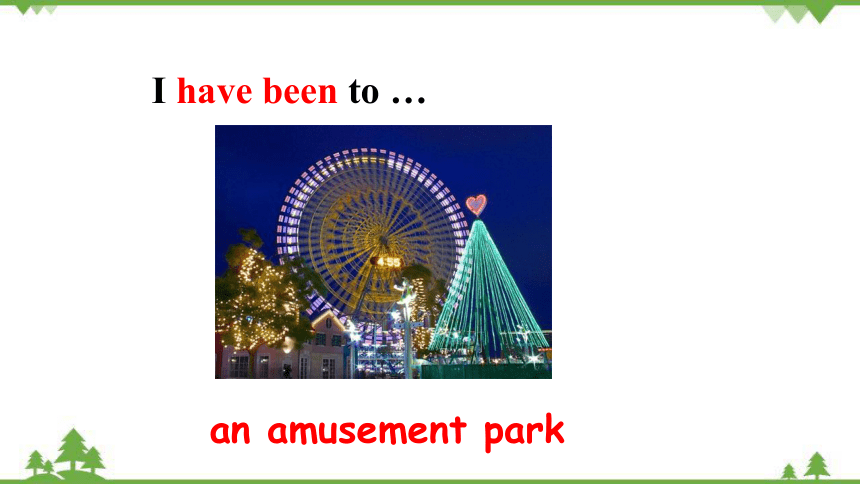
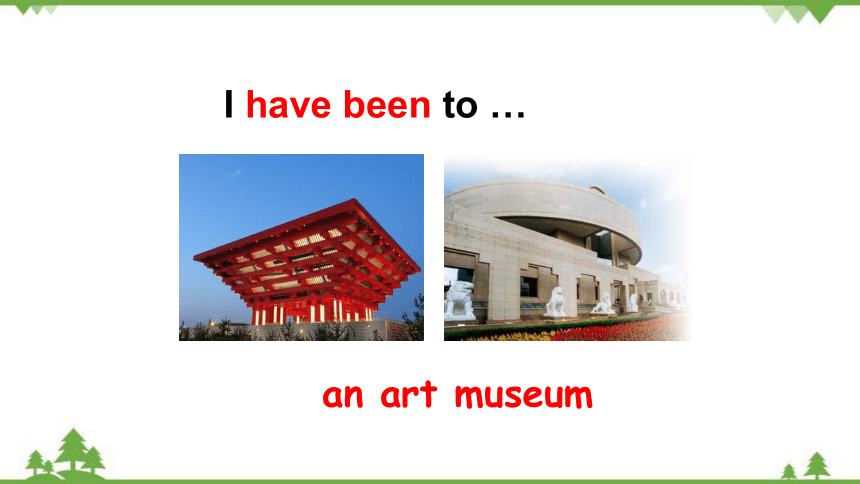
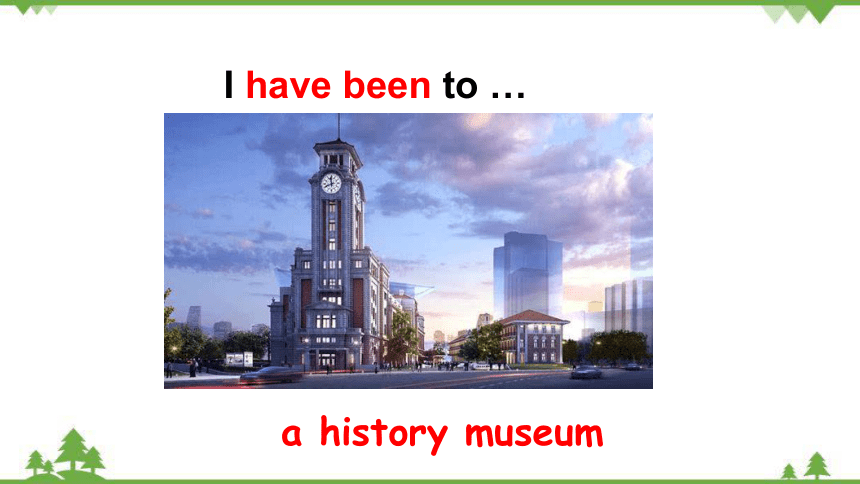
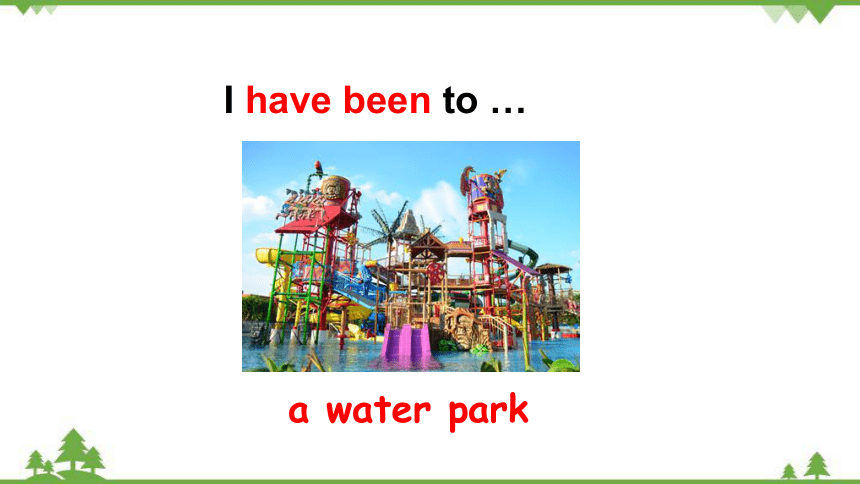
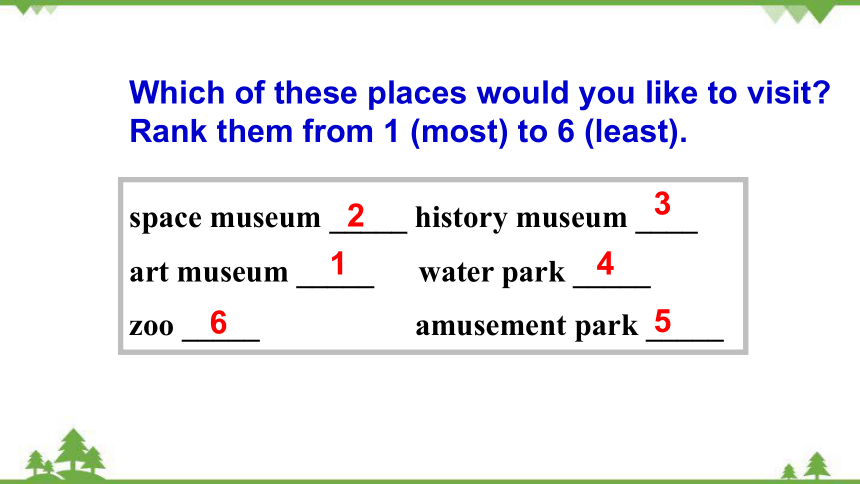
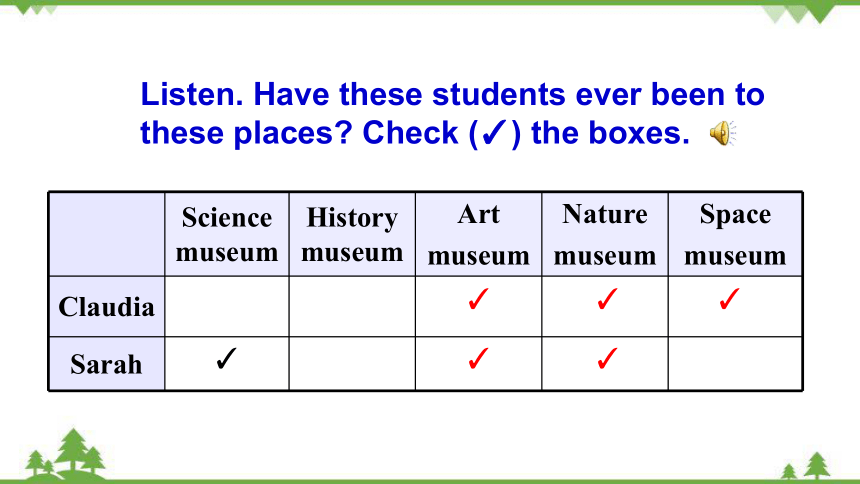
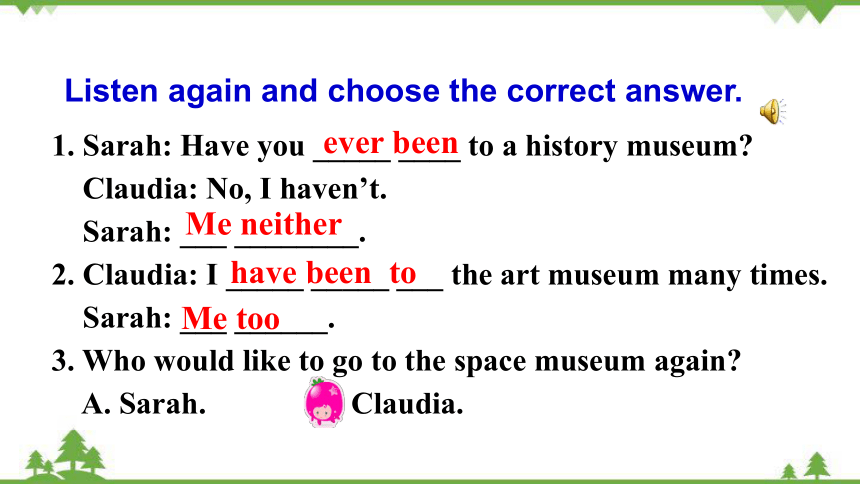
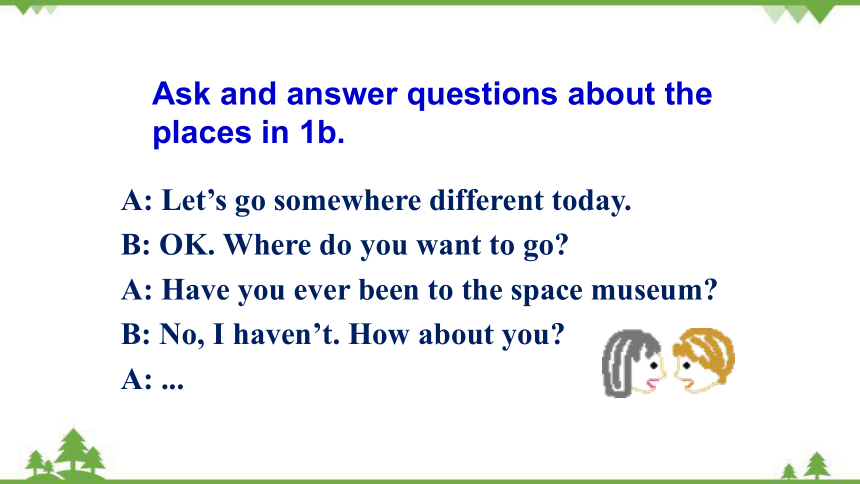
文档简介
(共44张PPT)
Unit 9
Have you ever been to a museum
人教版八年级英语下册
Section A 1a-2d
Objectives
To learn to talk about past experiences.
To learn where Claudia and Sarah have ever been to.
To remember the new words:amusement,
somewhere, camera,invention …
How was your vacation
Where did you go
I have been to shanghai.
I went to Shanghai last year.
Warming up
There are many fun places in Shanghai!
a space museum
I have been to …
an amusement park
I have been to …
I have been to …
an art museum
I have been to …
a history museum
a water park
I have been to …
space museum _____ history museum ____
art museum _____ water park _____
zoo _____ amusement park _____
Which of these places would you like to visit Rank them from 1 (most) to 6 (least).
1
2
3
4
5
6
1a
Listen. Have these students ever been to these places Check ( ) the boxes.
Science museum History museum Art
museum Nature
museum Space
museum
Claudia
Sarah
1b
1. Sarah: Have you _____ ____ to a history museum
Claudia: No, I haven’t.
Sarah: ___ ________.
2. Claudia: I _____ _____ ___ the art museum many times.
Sarah: ___ ______.
3. Who would like to go to the space museum again
A. Sarah. B. Claudia.
Listen again and choose the correct answer.
Me neither
ever been
have been to
Me too
Ask and answer questions about the places in 1b.
A: Let’s go somewhere different today.
B: OK. Where do you want to go
A: Have you ever been to the space museum
B: No, I haven’t. How about you
A: ...
1c
A: Let’s go somewhere interesting today.
B: OK. Where do you want to go
A: Have you ever been to a water park
B: No, I haven’t. How about you
A:I have been there only once.
B: …
Have you ever been to ...…
Where have I been
No, I haven’t.
I have never been to…
Yes, I have.
I have ever been to…
history museum
√
Me, too.
Have you ever been to …
Where have I been
The Great Wall
Yes, I have.
I have ever been to…
No, I haven’t.
I have never been to…
Me neither.
√
Have you ever been to …
Where have I been
amusement park
Yes, I have.
I have ever been to…
No, I haven’t.
I have never been to…
Me, too.
√
Look at the map of the town.
Listen and circle the places you hear.
2a
Conversation 1
Tina went to the space amusement last year.
T F
Jone has never been to the space museum.
T F
They are going to take the subway. T F
Listen again and circle T for true or F for false.
2b
Conversation 2
Linda has been to the amusement
park. T F
Linda went to the amusement
park yesterday. T F
Linda is going to the amusement
park again by bike. T F
Conversation 3
Frank had a great time at the
water park. T F
Frank’s friend has never been
to the water park. T F
Frank and his friend are going
skating. T F
A: Have you ever been to the space museum
B: Yes, I have. How about you
A: No, I haven’t.
B: Oh, it’s fantastic. Let’s go tomorrow.
A: OK. How are we going to get there
B: We can take the subway.
Look at the map in 2a and make conversations about the places.
2c
Conversation 1
A: Have you ever been to the water park
B: No, I haven’t. But I’m going there next week.
Would you like to come
A: Sure. How will we get there
B: We can ride our bikes.
A: Have you ever been to Disneyland
B: No, I’ve never been there.
A: Neither have I. Let’s go!
B: I’d really love to , but I don’t have any money.
A: Let’s go skating instead.
B: Ok, when do we go there
A: What about tomorrow
B: That sounds good.
Conversation 2
Anna: I went to the film museum last weekend.
Have you ever been there
Jill: Yes, I have. I went there back in April.
Anna: It’s really interesting, isn’t it It’s a great
way to spend a Saturday afternoon.
Jill: Yes, I love all the old movie cameras there.
Role-play the conversation.
2d
I learned about the inventions that led to
color movies, too.
Anna: So, what did you do on the weekend
Jill: I camped in the mountains with some
friends. We put up a tent and cooked outside.
Anna: That sounds fun. I’ve never been camping.
Jill: You should try it!
Role-play the conversation.
I went to the film museum last weekend. Have you ever been there …
Yes, I have. I went there back in April. …
1. — Have you ever been to a history museum
— No, I haven’t.
— Me neither.
Me neither是英语口语中的常用表达,意思是“我也不(没)”,与Me too意思相对。
如:My friends are happy. Me too.
Language points
(1) 英语中表示后者与前者情形相同“也不……”时,常用neither引起的倒装句。其结构为:Neither+助动词/系动词be/情态动词+主语
e.g. I’m not tall. Neither is she.
= I’m not tall. She’s not tall, either.
我个子不高,她个子也不高。
(2) 如果表示后者与前者情形相同,“也……”常用so引起的倒装句。其结构为:
so+助动词/系动词be/情态动词+主语
e.g. My friends are happy. So am I.
= My friends are happy. I’m happy, too./ I’m also happy.
我的朋友高兴, 我也很高兴。
both 意为“两者都”,一般用于肯定的陈述句。与of连用作主语时,其后谓语动词用复数形式;作定语时,其后常跟名词的复数形式。
both / neither / either用法辨析
neither 意为“两者都不或两者中任何一个也不”,
表示“全否定”,与of 连用作主语时,其
后谓语动词用单数形式;作定语时,只修
饰可数名词的单数形式。
either 意为“两者中的任何一个”,用作主语时,
其后谓语动词用单数形式;用作定语时,
只修饰可数名词的单数形式。
2. I learned about the inventions that led to color movies, too.
我还了解了一些发明,它们成就了彩色电影。此处learn是“了解;获知;得知”的意思,由介词about或of引入所获知的具体内容。
e.g. The children were all shocked to learn of
the death of their headmaster.
得知校长去世,孩子们都十分震惊。
3. I’ve never been camping. 我从未野营过。
此句为现在完成进行时,这一时态的结构 has/have been + 现在分词,表示从过去某一时刻一直延续至今的动作。在本句中,说话人使用这一时态来强调自己至今从未有过野营的经历,欠缺这方面的经验。
e.g. We’ve been living like this ever since the birthof
my little brother.
自打我小弟弟出生,我们就一直这样生活。
1. Where _____ you _____, Lisa I’m looking for you everywhere.
A. have; been B. have ;been to
C. have; gone D. did; go to
2. How long _____ his friend _____ New York
A. did; come B. has; go to
C. has; been to D. has; been in
I.单项选择。
A
D
Exercises
1. Have you seen Mr. Tang these days (yes)
_________________________________
2. Have you played kites this spring (no)
_________________________________
3. Have they watched the movie Titanic (yes)
__________________________________
4. Has your mother ever been to Tibet (never.)
_____________________________________
Ⅱ.用括号中给出的词回答问题。
No, she has never been to Tibet. ( No, never. )
Yes, I have..
No, I haven’t.
Yes, they have.
5. How long have you played the piano (two hours)
____________________________________
6. How long has Tom listened to English songs
(twelve years old)
_____________________________________
7. How many English story books have they read
this semester (six)
_____________________________________
8. How many cities have you visited (twelve)
______________________________________
I have visited twelve cities.
I have played the piano for two hours.
Since he was twelve years old.
They have read six English story books.
1. —I ______ ever _______ (visit) the Great Wall. What about you
—I _______ (visit) it when I was ten years old.
2. Tom __________ (not be) to Disneyland and he ________ (go) there with his parents this weekend.
Ⅲ.用所给单词的正确形式填空。
have
visited
visited
hasn’t been
is going
3. —Where’s Zhang Peng
—He ________ (go) to our math teacher’s office.
—How soon ______ he ______ (come) back
—In a few minutes, I think.
4. —How long have you been __________ (study) in this school
—For more than two years.
studying
has gone
will
come
Ⅳ.根据汉语意思完成句子。每空一词。
1. 他曾经去过广州吗?
______ he ______ _______ _____ the Guangzhou
2. 我从没听到过那么恐怖的故事。
I _____ ______ _______ such a scary story.
3. 他已经去过北京三次了。
He _____ ______ ____Beijing three times.
has been to
Has ever been to
have never heard
4. 我去过北京两次。
I ______ ______ _____ Beijing twice.
5. 大声读书是一种学习英语的好方法。
Reading aloud is __ ____ ____ ___ learn
English.
6. 昨天他没有去那,我也没去。
He didn’t go there yesterday. _____ ________.
have been to
a good way to
Me neither
U9 S -
(2019 沈阳)
— Why is Grace’s Chinese so good
— Because she _____ China for ten years.
A. has gone to B. has been to
C. has come to D. has been in
中考链接
【答案】D
【解析】句意:“什么格蕾丝的中文这么好?”,“因为她在中国已经十年了。” for ten years是一段持续的时间,用于现在完成时;go和come是终止性动词,不可和持续的时间连用。have been to意为“曾经去过某地”,现在已不在那里了;have been in意为“在某地呆了多长时间”,故选D。
1. Listen to the listening material again and remember the language points.
2. Preview the next lesson.
Homework
Unit 9
Have you ever been to a museum
人教版八年级英语下册
Section A 1a-2d
Objectives
To learn to talk about past experiences.
To learn where Claudia and Sarah have ever been to.
To remember the new words:amusement,
somewhere, camera,invention …
How was your vacation
Where did you go
I have been to shanghai.
I went to Shanghai last year.
Warming up
There are many fun places in Shanghai!
a space museum
I have been to …
an amusement park
I have been to …
I have been to …
an art museum
I have been to …
a history museum
a water park
I have been to …
space museum _____ history museum ____
art museum _____ water park _____
zoo _____ amusement park _____
Which of these places would you like to visit Rank them from 1 (most) to 6 (least).
1
2
3
4
5
6
1a
Listen. Have these students ever been to these places Check ( ) the boxes.
Science museum History museum Art
museum Nature
museum Space
museum
Claudia
Sarah
1b
1. Sarah: Have you _____ ____ to a history museum
Claudia: No, I haven’t.
Sarah: ___ ________.
2. Claudia: I _____ _____ ___ the art museum many times.
Sarah: ___ ______.
3. Who would like to go to the space museum again
A. Sarah. B. Claudia.
Listen again and choose the correct answer.
Me neither
ever been
have been to
Me too
Ask and answer questions about the places in 1b.
A: Let’s go somewhere different today.
B: OK. Where do you want to go
A: Have you ever been to the space museum
B: No, I haven’t. How about you
A: ...
1c
A: Let’s go somewhere interesting today.
B: OK. Where do you want to go
A: Have you ever been to a water park
B: No, I haven’t. How about you
A:I have been there only once.
B: …
Have you ever been to ...…
Where have I been
No, I haven’t.
I have never been to…
Yes, I have.
I have ever been to…
history museum
√
Me, too.
Have you ever been to …
Where have I been
The Great Wall
Yes, I have.
I have ever been to…
No, I haven’t.
I have never been to…
Me neither.
√
Have you ever been to …
Where have I been
amusement park
Yes, I have.
I have ever been to…
No, I haven’t.
I have never been to…
Me, too.
√
Look at the map of the town.
Listen and circle the places you hear.
2a
Conversation 1
Tina went to the space amusement last year.
T F
Jone has never been to the space museum.
T F
They are going to take the subway. T F
Listen again and circle T for true or F for false.
2b
Conversation 2
Linda has been to the amusement
park. T F
Linda went to the amusement
park yesterday. T F
Linda is going to the amusement
park again by bike. T F
Conversation 3
Frank had a great time at the
water park. T F
Frank’s friend has never been
to the water park. T F
Frank and his friend are going
skating. T F
A: Have you ever been to the space museum
B: Yes, I have. How about you
A: No, I haven’t.
B: Oh, it’s fantastic. Let’s go tomorrow.
A: OK. How are we going to get there
B: We can take the subway.
Look at the map in 2a and make conversations about the places.
2c
Conversation 1
A: Have you ever been to the water park
B: No, I haven’t. But I’m going there next week.
Would you like to come
A: Sure. How will we get there
B: We can ride our bikes.
A: Have you ever been to Disneyland
B: No, I’ve never been there.
A: Neither have I. Let’s go!
B: I’d really love to , but I don’t have any money.
A: Let’s go skating instead.
B: Ok, when do we go there
A: What about tomorrow
B: That sounds good.
Conversation 2
Anna: I went to the film museum last weekend.
Have you ever been there
Jill: Yes, I have. I went there back in April.
Anna: It’s really interesting, isn’t it It’s a great
way to spend a Saturday afternoon.
Jill: Yes, I love all the old movie cameras there.
Role-play the conversation.
2d
I learned about the inventions that led to
color movies, too.
Anna: So, what did you do on the weekend
Jill: I camped in the mountains with some
friends. We put up a tent and cooked outside.
Anna: That sounds fun. I’ve never been camping.
Jill: You should try it!
Role-play the conversation.
I went to the film museum last weekend. Have you ever been there …
Yes, I have. I went there back in April. …
1. — Have you ever been to a history museum
— No, I haven’t.
— Me neither.
Me neither是英语口语中的常用表达,意思是“我也不(没)”,与Me too意思相对。
如:My friends are happy. Me too.
Language points
(1) 英语中表示后者与前者情形相同“也不……”时,常用neither引起的倒装句。其结构为:Neither+助动词/系动词be/情态动词+主语
e.g. I’m not tall. Neither is she.
= I’m not tall. She’s not tall, either.
我个子不高,她个子也不高。
(2) 如果表示后者与前者情形相同,“也……”常用so引起的倒装句。其结构为:
so+助动词/系动词be/情态动词+主语
e.g. My friends are happy. So am I.
= My friends are happy. I’m happy, too./ I’m also happy.
我的朋友高兴, 我也很高兴。
both 意为“两者都”,一般用于肯定的陈述句。与of连用作主语时,其后谓语动词用复数形式;作定语时,其后常跟名词的复数形式。
both / neither / either用法辨析
neither 意为“两者都不或两者中任何一个也不”,
表示“全否定”,与of 连用作主语时,其
后谓语动词用单数形式;作定语时,只修
饰可数名词的单数形式。
either 意为“两者中的任何一个”,用作主语时,
其后谓语动词用单数形式;用作定语时,
只修饰可数名词的单数形式。
2. I learned about the inventions that led to color movies, too.
我还了解了一些发明,它们成就了彩色电影。此处learn是“了解;获知;得知”的意思,由介词about或of引入所获知的具体内容。
e.g. The children were all shocked to learn of
the death of their headmaster.
得知校长去世,孩子们都十分震惊。
3. I’ve never been camping. 我从未野营过。
此句为现在完成进行时,这一时态的结构 has/have been + 现在分词,表示从过去某一时刻一直延续至今的动作。在本句中,说话人使用这一时态来强调自己至今从未有过野营的经历,欠缺这方面的经验。
e.g. We’ve been living like this ever since the birthof
my little brother.
自打我小弟弟出生,我们就一直这样生活。
1. Where _____ you _____, Lisa I’m looking for you everywhere.
A. have; been B. have ;been to
C. have; gone D. did; go to
2. How long _____ his friend _____ New York
A. did; come B. has; go to
C. has; been to D. has; been in
I.单项选择。
A
D
Exercises
1. Have you seen Mr. Tang these days (yes)
_________________________________
2. Have you played kites this spring (no)
_________________________________
3. Have they watched the movie Titanic (yes)
__________________________________
4. Has your mother ever been to Tibet (never.)
_____________________________________
Ⅱ.用括号中给出的词回答问题。
No, she has never been to Tibet. ( No, never. )
Yes, I have..
No, I haven’t.
Yes, they have.
5. How long have you played the piano (two hours)
____________________________________
6. How long has Tom listened to English songs
(twelve years old)
_____________________________________
7. How many English story books have they read
this semester (six)
_____________________________________
8. How many cities have you visited (twelve)
______________________________________
I have visited twelve cities.
I have played the piano for two hours.
Since he was twelve years old.
They have read six English story books.
1. —I ______ ever _______ (visit) the Great Wall. What about you
—I _______ (visit) it when I was ten years old.
2. Tom __________ (not be) to Disneyland and he ________ (go) there with his parents this weekend.
Ⅲ.用所给单词的正确形式填空。
have
visited
visited
hasn’t been
is going
3. —Where’s Zhang Peng
—He ________ (go) to our math teacher’s office.
—How soon ______ he ______ (come) back
—In a few minutes, I think.
4. —How long have you been __________ (study) in this school
—For more than two years.
studying
has gone
will
come
Ⅳ.根据汉语意思完成句子。每空一词。
1. 他曾经去过广州吗?
______ he ______ _______ _____ the Guangzhou
2. 我从没听到过那么恐怖的故事。
I _____ ______ _______ such a scary story.
3. 他已经去过北京三次了。
He _____ ______ ____Beijing three times.
has been to
Has ever been to
have never heard
4. 我去过北京两次。
I ______ ______ _____ Beijing twice.
5. 大声读书是一种学习英语的好方法。
Reading aloud is __ ____ ____ ___ learn
English.
6. 昨天他没有去那,我也没去。
He didn’t go there yesterday. _____ ________.
have been to
a good way to
Me neither
U9 S -
(2019 沈阳)
— Why is Grace’s Chinese so good
— Because she _____ China for ten years.
A. has gone to B. has been to
C. has come to D. has been in
中考链接
【答案】D
【解析】句意:“什么格蕾丝的中文这么好?”,“因为她在中国已经十年了。” for ten years是一段持续的时间,用于现在完成时;go和come是终止性动词,不可和持续的时间连用。have been to意为“曾经去过某地”,现在已不在那里了;have been in意为“在某地呆了多长时间”,故选D。
1. Listen to the listening material again and remember the language points.
2. Preview the next lesson.
Homework
同课章节目录
- Unit 1 What's the matter?
- Section A
- Section B
- Unit 2 I'll help to clean up the city parks.
- Section A
- Section B
- Unit 3 Could you please clean your room?
- Section A
- Section B
- Unit 4 Why don't you talk to your parents?
- Section A
- Section B
- Unit 5 What were you doing when the rainstorm came
- Section A
- Section B
- Review of Units 1-5
- Unit 6 An old man tried to move the mountains.
- Section A
- Section B
- Unit 7 What's the highest mountain in the world?
- Section A
- Section B
- Unit 8 Have you read Treasure Island yet?
- Section A
- Section B
- Unit 9 Have you ever been to a museum?
- Section A
- Section B
- Unit 10 I've had this bike for three years.
- Section A
- Section B
